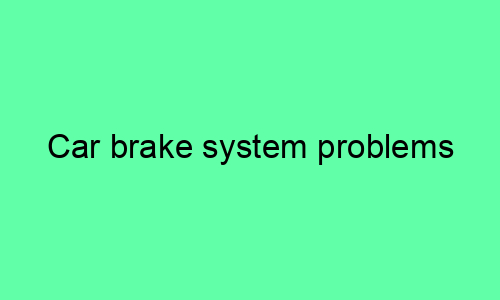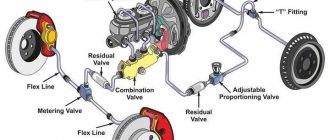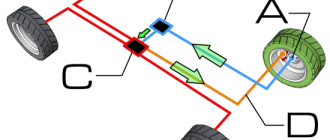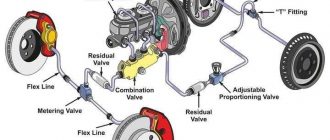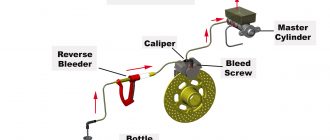Car Brake System Problems
Introduction
The brake system is one of the most important safety features on a car. It allows you to slow down and stop the vehicle, and it helps to prevent accidents. However, like any other mechanical system, the brake system can experience problems. If you’re experiencing any issues with your brakes, it’s important to have them checked out by a qualified mechanic as soon as possible.
Common Brake System Problems
There are a number of different problems that can affect the brake system. Some of the most common include:
- Brake pads worn out: Brake pads are the components that press against the brake rotors to slow down the vehicle. Over time, brake pads can wear out and become less effective. This can lead to longer stopping distances and increased risk of an accident.
- Brake rotors warped: Brake rotors are the discs that the brake pads press against. If the rotors become warped, they can cause the brake pads to vibrate and make noise. This can also lead to longer stopping distances and increased risk of an accident.
- Brake lines leaking: Brake lines are the tubes that carry brake fluid from the master cylinder to the brake calipers. If the brake lines leak, the brake fluid will not be able to reach the calipers and the brakes will not work properly. This can lead to a complete loss of braking power and a very dangerous situation.
- Master cylinder failure: The master cylinder is the component that pumps brake fluid to the brake lines. If the master cylinder fails, the brake fluid will not be able to reach the calipers and the brakes will not work properly. This can also lead to a complete loss of braking power.
- ABS system malfunction: The ABS system is a safety feature that helps to prevent the wheels from locking up during braking. If the ABS system malfunctions, it can cause the wheels to lock up and the vehicle to skid. This can lead to a loss of control and an increased risk of an accident.
Symptoms of Brake System Problems
There are a number of different symptoms that can indicate a problem with the brake system. Some of the most common include:
- Spongy brake pedal: A spongy brake pedal means that the pedal feels soft and mushy when you press on it. This can indicate a leak in the brake lines or a problem with the master cylinder.
- Brake pedal pulsation: If the brake pedal pulsates when you press on it, it can indicate that the brake rotors are warped.
- Squealing or grinding noises when braking: Squealing or grinding noises when braking can indicate that the brake pads are worn out.
- Increased stopping distances: If you notice that your car is taking longer to stop than usual, it can indicate a problem with the brake system.
- ABS system warning light: If the ABS system warning light comes on, it means that there is a problem with the ABS system. You should have the system checked out by a qualified mechanic as soon as possible.
What to Do If You Experience Brake System Problems
If you experience any of the symptoms of brake system problems, it’s important to have your car checked out by a qualified mechanic as soon as possible. The mechanic will be able to diagnose the problem and recommend the best course of action. Depending on the severity of the problem, the mechanic may recommend replacing the brake pads, rotors, brake lines, or master cylinder. In some cases, the mechanic may also need to repair or replace the ABS system.
Preventing Brake System Problems
There are a number of things you can do to help prevent brake system problems. These include:
- Regular brake inspections: Having your brakes inspected by a qualified mechanic on a regular basis can help to identify and fix potential problems before they become serious.
- Replacing brake pads and rotors as needed: Brake pads and rotors wear out over time, so it’s important to replace them as needed. The mechanic will be able to tell you when they need to be replaced.
- Avoid hard braking: Hard braking can put a lot of stress on the brake system and lead to premature wear and tear. If possible, try to brake smoothly and gradually.
- Use the ABS system: The ABS system can help to prevent the wheels from locking up during braking, which can help to reduce wear and tear on the brake system.
Conclusion
The brake system is a critical safety feature on a car. If you’re experiencing any problems with your brakes, it’s important to have them checked out by a qualified mechanic as soon as possible. By following these tips, you can help to prevent brake system problems and keep your car safe on the road.
